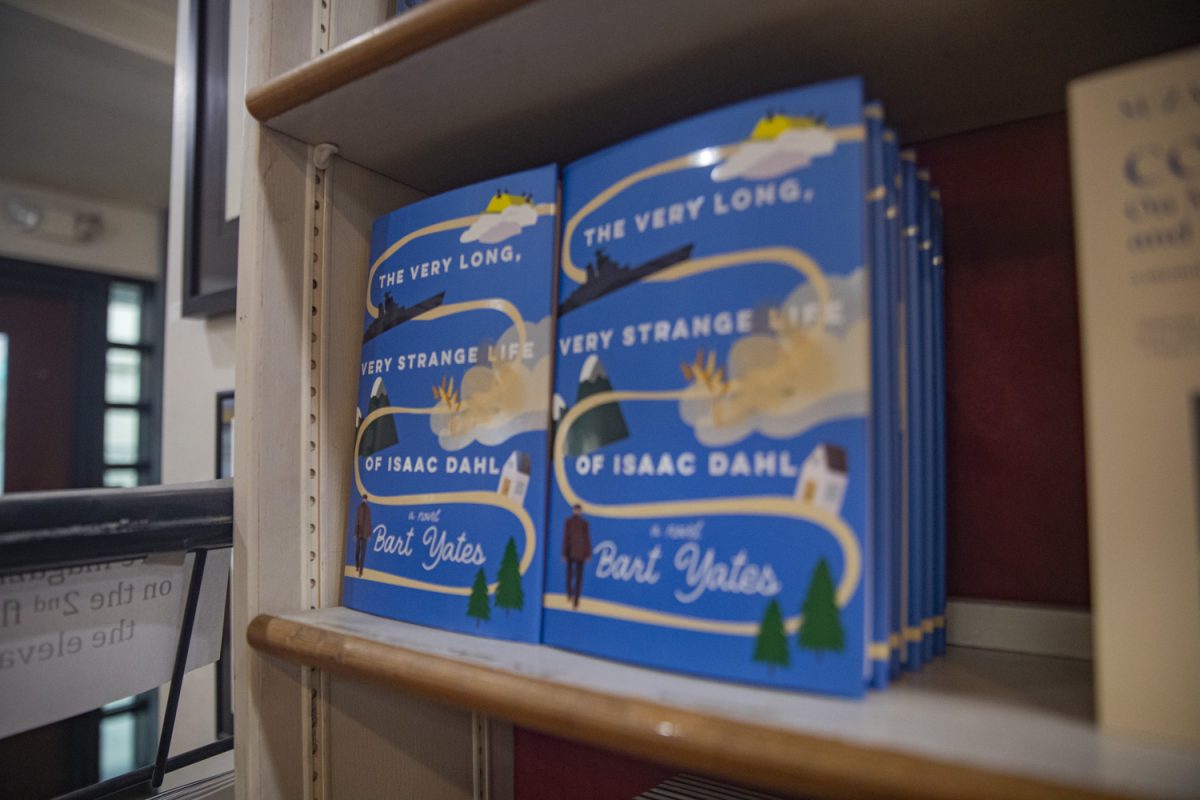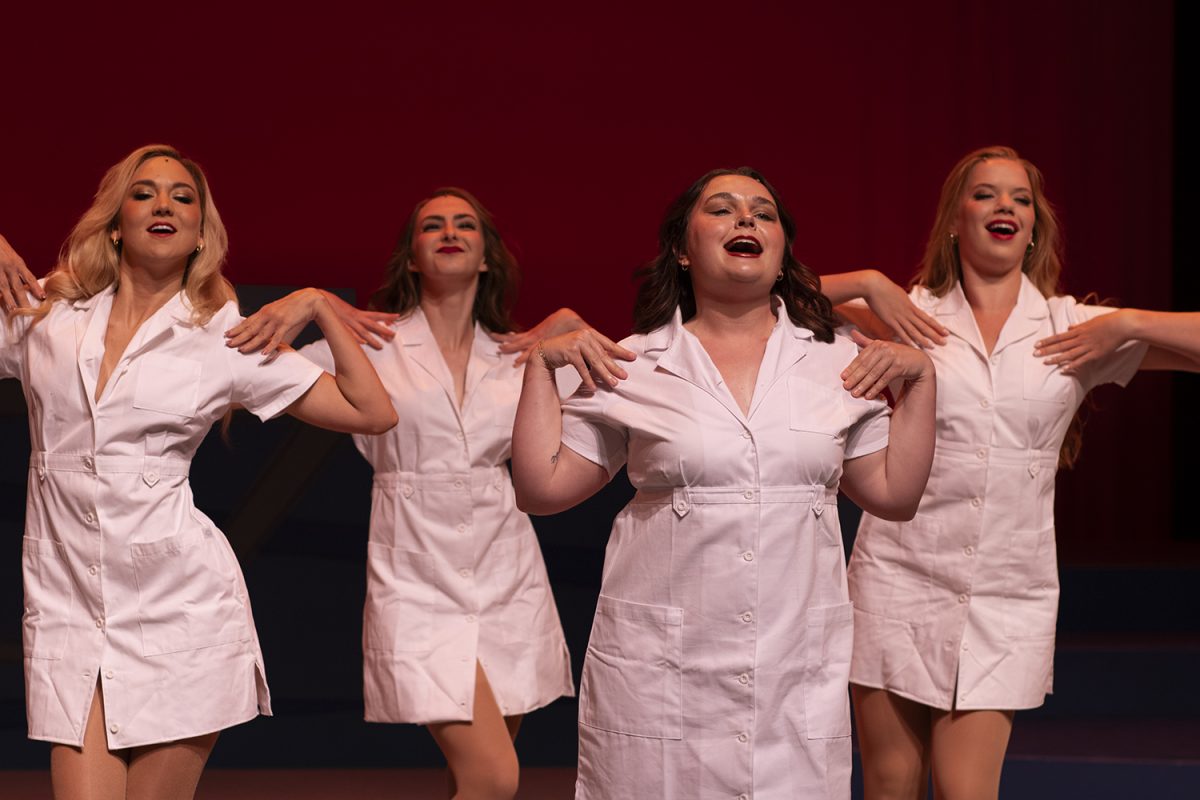
Lights. Camera. Graduation?
To graduate with Honors, many students spend countless hours in the library and study nooks, drinking their body weight in coffee and pouring over notes and textbooks. Amelia Peacock and Kathryn Wilson may have done just that, but their Honors recognition at graduation now hangs on staged shows.
The two senior theater majors will stage new works for the Honors recognition. The shows will be performed at 8 p.m. Friday and Saturday in the Theater Building’s Theater B; admission is free for UI students and $5 for the general public.
“I worked on an Honors project two years ago, and I’ve always been in the Honors Program, so I thought it would be a cool way to end my time here, to do a project on my own,” Peacock said. “I don’t know if it’s to prove to myself that I can do this or just to see if I can, but it’s really challenging and empowering to see it happen.”
Peacock’s project takes the form of a one-woman show she wrote, directed, and will perform. She this week titled her show “One in a Million,” though for much of the process it remained untitled, allowing her plenty of freedom of expression and form.
Wilson took a different, more traditional approach with her project, “Home,” a play adapted from a piece of fiction she had written.
“ ‘Home’ is about a woman who returns to her childhood home on the fifth anniversary of her mother’s death,” she said. “She has to confront memories she’s repressed. In the course of the play, things about the house and being back there trigger memories for her, and we see those memories on stage.”
The memories seem like young adults leaping around on stage acting as children, shooting fake guns and pretending the floor is lava, but they touch on the relationship among Laney, the main character, and her family.
Laney stopped speaking to her father after her mother died and now has a 3-year-old daughter he has never met. Her younger brother asked her to come back for a memorial, but Wilson said Laney only came back for him.
The story, Wilson said, is a bit heavy and thus took a lot of work.
“I spent a long time writing it, and rewriting it, and rewriting it; I think we’re on draft five or six now,” she said. “Then I had to recruit actors; there isn’t really an audition process for it.”
Finding a cast was daunting, but Wilson signed her first actor, Aaron Weiner, before he had read the script.
“I trust Katie and her abilities, so I knew it would be a worthwhile project,” he said. “The script is accessible; I think it’ll resonate with a lot of audience members, and like any theater project, it’ll provoke people to think a little harder about their lives.”
Thinking hard about her life was prompted Peacock’s project. Alone on stage, just her, a stool, and a spotlight, she reflects on major moments of her life. She weaves them, starting with her grandmother’s death and incorporating things from prom to moving to college. The story is her own and so was the work and preparation.
“It’s all me — I set the deadlines, I have to write it, I have to perform it, I have to direct it,” Peacock said. “They’re my own words; I can’t go talk to a playwright or a director [to find meaning]. There are people I can go talk to and bounce ideas off, but essentially, it’s all coming from me.”
Working on her own has been very different from a regular play, she said, though it did not seem that way initially. This process has been “even bigger and scarier” than her other work, she said.
The project grew from its original plan for Wilson, when she had to take on more responsibilities in the production.
“I learned a lot about what stage managers do, because I’ve had to double as stage manager and playwright,” Wilson said. “I also learned a lot about the playwriting process, what it means. Learning how to write stakes in a play, to give actors something to work with, was an intense process.”
Wilson had some assistance in UI junior theater major Annie Levitz, who agreed to direct the show.
“I was first simply attracted to the idea of working with [Wilson],” Levitz said. “She’s a great energy to have in a rehearsal room, and so I knew I wanted to read the script and learn more. I think the moment that I first got hooked was the introduction to the memories. I am consistently intrigued by the theme of distorted memories and the way they shift with perspective. Physical memories in scripts allow for so many discoveries to be made.”
Though the show intrigued her, Levitz kept Wilson at the heart of the show, stopping rehearsals to ensure that each line was spoken exactly as written, honoring the intended words.
“A challenge I faced when beginning to work on an Honors project that isn’t my own was finding a way to best showcase [Wilson] and her work as above all else the purpose of this show is to act as a culmination of her Honors work,” Levitz said. “Lucky for me, though, [Wilson] wrote a truly lovely script, so my way of showcasing her is by simply honoring the words she wrote and respecting her vision.”
On the other hand, with no one to alter her vision, Peacock said, she took this as a personal experience.
“I really wanted to ask the questions that are hard to ask at this point in my life. I’m graduating college and going out into the world,” Peacock said. “I kind of wanted to delve into the questions that I haven’t let myself ask: Who am I now? What are my morals and values? How have they changed? What am I going to do with the rest of my life? The kind of questions you either give a fake answer to or just avoid completely. It’s pretty autobiographical. I’m just telling stories from my life, focusing on the ones that changed me, and why they did, and why they have so much meaning in my life.”
Graduating with Honors, she said, also holds special meaning in her life.
“I’m an only child, so I’ve had the luxury and the fault of having parents who really care about every little thing I’m doing, including my studies,” she said. “So I’ve always been driven to do well in school and to be a perfectionist, so the Honors Program was really important to me, to graduate with Honors and a double major. They’re all just words, but at the end of the day I can say to myself that I made it work and I pushed myself and I have this project to show for it, good or bad.”
THEATER






